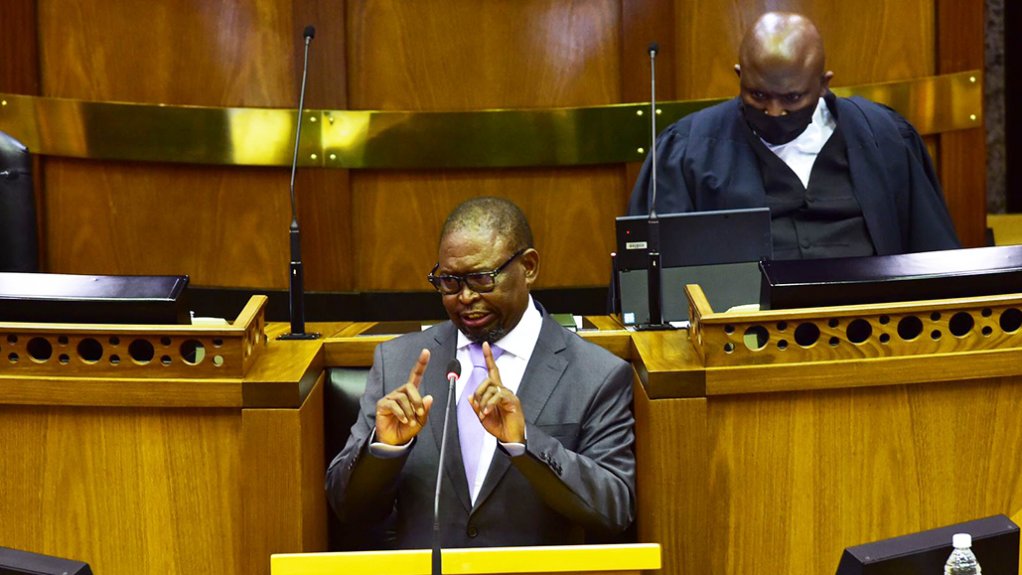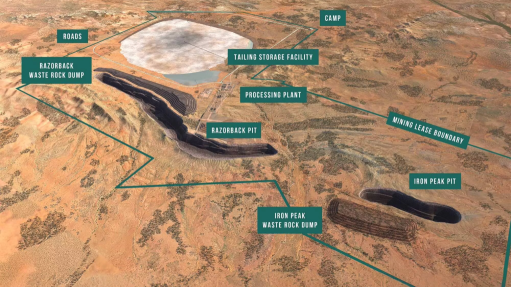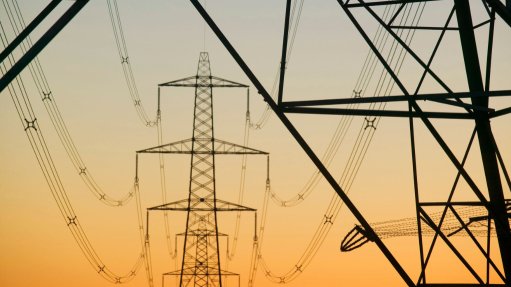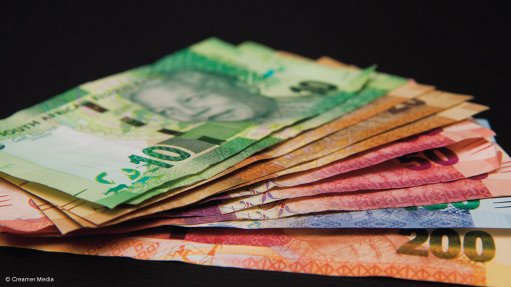Higher revenue collections support consolidation as growth headwinds strengthen
Better-than-expected revenue collection enabled Finance Minister Enoch Godongwana to report an improvement in government’s fiscal position relative to the one forecast in the February Budget.
However, slowing global and domestic growth together with ongoing power cuts pose a risk to the fiscal outlook, as does the prospect of a higher-than-budgeted public-service wage settlement.
The National Treasury had already lowered its gross domestic product (GDP) growth forecast for 2022 to only 1.9%, having projected growth of 2.1% in February. GDP growth is also expected to average only 1.6% over the coming three years.
Revenue collections during the first half of 2022/23 were 9% higher than the same period of the prior year as the positive impact of high commodity prices continued.
The gross tax revenue estimate for 2022/23 was, thus, projected to be R83.5-billion higher, at R1.68-trillion, than the R1.59-trillion forecast in February.
Godongwana said government would use a portion of this revenue to reduce the budget deficit, with the consolidated budget deficit projected to narrow from 4.9% of GDP in 2022/23 to 4.1% next year, 3.9% in 2024/25 and 3.2% in 2025/26.
However, spending on health, education, local government free basic services, infrastructure, and policing would also be increased, along with support for Denel, Sanral and Transnet.
Additional new expenditure of R37-billion was outlined for 2022/23, comprising R54.1-billion in spending increases, partially offset by projected underspending.
SANRAL, TRANSNET, DENEL SUPPORT
Sanral would receive an additional R23.7-billion to pay off government-guaranteed debt, which is said to be conditional on a solution to Phase 1 of the Gauteng Freeway Improvement Project (GFIP).
In addition, Godongwana announced that a decision had been made to transfer Sanral’s R47-billion debt relating to the GFIP to the national and Gauteng governments in a bid to resolve the long-standing e-toll issue.
He also revealed that the Gauteng provincial administration would assume responsibility for the cost of maintaining the 201 km of highway and associated interchanges, as well as any future investments.
Seventy percent of the debt, or R32.9-billion, would be absorbed by the national government, while the Gauteng provincial government would take on the 30% balance, or R14.1-billion.
Another R5.8-billion would be directed to Transnet, half to repair infrastructure damaged by the April floods in KwaZulu-Natal, and half to increase locomotive capacity, which together with theft of cable and lines was undermining the performance of some key export corridors.
Transnet Freight Rail has confirmed that it has over 300 locomotives currently out of service, owing to a long-running dispute with its Chinese supplier, which has refused to provide the utility with locomotive spares. A recent in-principle settlement agreement is expected to clear the way for both the delivery of spares and additional locomotives.
Transnet immediately welcomed the announcement of the capital allocation to support it in dealing with the unexpected and unforeseen expenditure as a result of the KwaZulu-Natal floods in April. It confirmed that the balance of the funding will go towards the rehabilitation of rolling stock, including funding for the return to service of long-standing locomotives.
Arms manufacturer Denel would receive R3.4-billion to complete its turnaround plan and R204.7-million to reduce contingent liabilities arising from its weak financial position.
The Minister said that discussions were still under way to consider options for a replacement for the temporary Covid-19 social relief of distress grant, which was currently being distributed to 7.4-million people.
“No final decision has been made about a replacement or how it would be financed. As a result, the temporary grant will be extended for one year until March 2024.”
PRIMARY SURPLUS
Godongwana also announced that government expected to achieve a primary budget surplus, with revenue exceeding non-interest spending, of 0.7% in 2023/24.
However, he did not provide details of what was expected to be a R200-billion debt-relief package for Eskom, announcing that the scale and the structure of the programme would be unveiled only in February.
Gross debt is now projected to stabilise at 71.4% of GDP in 2022/23, representing a material improvement on the February forecast of debt peaking at 75.1% of GDP in 2024/25.
“This is mainly driven by higher nominal GDP projections, resulting from higher inflation, and an improved primary balance given better-than-expected revenue estimates.
“These factors outweigh the adverse impact of higher interest rates and a weaker exchange rate.”
With a broad slowdown in global growth and high inflation forecast, however, Godongwana outlined several risks to the fiscal outlook, including:
- The slowdown negatively affecting domestic growth and revenue collection;
- continuous electricity supply constraints;
- higher-than-budgeted public-service wage costs, which could trigger fiscal measures or reductions in headcounts;
- the materialisation of contingent liabilities that are largely associated with financially distressed State-owned companies; and
- new, unfunded spending pressures.
Government would also seek to address deficiencies in the antimoney laundering framework identified by the Financial Action Task Force.
“These changes are intended to reduce the risk and incidence of financial crime and corruption, and to avoid greylisting.
“Over the 2023 Medium-Term Expenditure Framework period, functions critical to the anti-money laundering regime, particularly in the law enforcement agencies and the Financial Intelligence Centre, will receive additional resources to carry out this work.
INFRASTRUCTURE & GROWTH
The Minister said that rapid and decisive implementation of structural reforms, especially in the energy sector, remained crucial to improve the economy’s productive capacity and international competitiveness.
Government would increase infrastructure budgets over the coming three year to support economic growth and development.
Spending on building and other fixed structures was projected to increase at an average yearly pace of 19% over the period from R66.7-billion in 2022/23 to R112.5-billion by 2025/26, while public entities planned to invest R145.8-billion in infrastructure over the period, including R85.3-billion in the transport sector and R33.3-billion in the water sector.
Projects recommended through the Budget Facility for Infrastructure at the national and provincial level amount to R4.8-billion in 2023/24, R5.8-billion in 2024/25 and R6.4-billion in 2025/26.
“At the same time, government recognises that the infrastructure challenge is not only a matter of money, but of efficiency and capacity.
“The 2023 Budget will propose funding to support project preparation.”
Article Enquiry
Email Article
Save Article
Feedback
To advertise email advertising@creamermedia.co.za or click here
Announcements
What's On
Subscribe to improve your user experience...
Option 1 (equivalent of R125 a month):
Receive a weekly copy of Creamer Media's Engineering News & Mining Weekly magazine
(print copy for those in South Africa and e-magazine for those outside of South Africa)
Receive daily email newsletters
Access to full search results
Access archive of magazine back copies
Access to Projects in Progress
Access to ONE Research Report of your choice in PDF format
Option 2 (equivalent of R375 a month):
All benefits from Option 1
PLUS
Access to Creamer Media's Research Channel Africa for ALL Research Reports, in PDF format, on various industrial and mining sectors
including Electricity; Water; Energy Transition; Hydrogen; Roads, Rail and Ports; Coal; Gold; Platinum; Battery Metals; etc.
Already a subscriber?
Forgotten your password?
Receive weekly copy of Creamer Media's Engineering News & Mining Weekly magazine (print copy for those in South Africa and e-magazine for those outside of South Africa)
➕
Recieve daily email newsletters
➕
Access to full search results
➕
Access archive of magazine back copies
➕
Access to Projects in Progress
➕
Access to ONE Research Report of your choice in PDF format
RESEARCH CHANNEL AFRICA
R4500 (equivalent of R375 a month)
SUBSCRIBEAll benefits from Option 1
➕
Access to Creamer Media's Research Channel Africa for ALL Research Reports on various industrial and mining sectors, in PDF format, including on:
Electricity
➕
Water
➕
Energy Transition
➕
Hydrogen
➕
Roads, Rail and Ports
➕
Coal
➕
Gold
➕
Platinum
➕
Battery Metals
➕
etc.
Receive all benefits from Option 1 or Option 2 delivered to numerous people at your company
➕
Multiple User names and Passwords for simultaneous log-ins
➕
Intranet integration access to all in your organisation




















